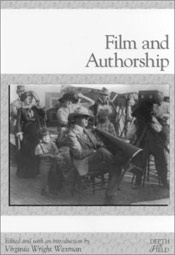(Rutgers University Press, 280 pages, $24.95)
By Virginia Wright Wexman

"Are directors to be thought of as social agents, psychic scribes, or spectator-induced fictions? Are they conscious craftspeople, bundles of libidinous energies, or cultural conduits?" Virginia Wright Wexman ponders such things in her expansive introduction to Film and Authorship. She sets the stage for a collection of complex, scholarly articles that thoughtfully examine the nuances of film authorship in theory and in practice.
Divided into three sections ("Theoretical Statements," "Historical and Institutional Contexts" and "Case Studies"), the book appropriately begins with "The Auteur Theory Revisited" by Andrew Sarris, who is "officially credited or blamed for ... bringing auteur into the English language."
In "Writing Himself into History: Oscar Micheaux," Pearl Bowser and Louise Spence analyze the African-American filmmaker's groundbreaking work. Kaja Silverman's "The Female Authorial Voice" explores such possibilities as Hitchcock's own authorial system containing "a female voice as one of its consistent although generally submerged elements."
The eclectic collection also looks at film authorship from lesbian, Latin American and Chicano perspectives, and addresses the commercial value of the director as star. From Sumiko Higashi's chapter on Cecil B. DeMille we learn that as early as 1915, producer Jesse L. Lasky wrote to partner Sam Goldfish (Goldwyn) of their company's director general, DeMille: "...he is the biggest asset we have, so let's use it for all its worth."
Review written by Lisa Mitchell